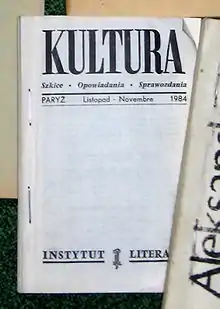samizdat
English
WOTD – 30 September 2016

Paryska kultura (Parisian Culture), a Polish samizdat from the 1980s
Etymology
Borrowed from Russian самизда́т (samizdát, “self-publishing”), from сам (sam, “self”) + изда́т (izdát), an abbreviation of изда́тельство (izdátelʹstvo, “publishing house, publishing”) (compare Russian Госизда́т (Gosizdát, “State Publisher”)).
Pronunciation
- (Received Pronunciation) IPA(key): /ˈsæmɪzdæt/, /səmɪzˈdæt/
- Hyphenation: sa‧miz‧dat
Noun
samizdat (countable and uncountable, plural samizdats)
- (uncountable, often attributive) The secret copying and sharing of illegal publications, chiefly in the Soviet Union; underground publishing and its publications. [from 1950s.]
- 1975, F[erdinand] J[oseph] M[aria] Feldbrugge, “Samizdat: Origins and Organization”, in Samizdat and Political Dissent in the Soviet Union, Leiden: A[lbertus] W[illem] Sijthoff, →ISBN, pages 1 and 3:
- [page 1] In a general sense any copy of a document which has been produced in the Soviet Union outside the chain of state publishing houses may be referred to as samizdat. […] [page 3] This term is modeled on the shortened form—gosizdat—of State Publishing House (Gosudarstvennoe Izdatel'stvo). […] According to Julius Telesin, a Russian writer who emigrated to Israel in 1970, the word samizdat occurs first in the late fifties when a Moscow poet, exasperated with the operation of the censorship system, bound together the typewritten sheets of his poems and wrote Samsebiaizdate ("Publishing House for Oneself") in the place where the name of the publishing house would normally appear. He also used the term samizdat with the same meaning but, as Telesin observes, samizdat ("self-publishing house") subsequently acquired a wider meaning.
- 1992, Igor Hajek, “Samizdat Literature: An Introduction”, in Marketa Goetz-Stankiewicz, editor, Good-bye, Samizdat: Twenty Years of Czechoslovak Underground Writing, Evanston, Ill.: Northwestern University Press, →ISBN, page 4:
- From a clandestine network of friends passing to each other typed copies of their new work, the initiative developed over the years into a parallel publishing system. […] [I]n cities the inquisitive reader did not have much difficulty in obtaining access to what was in fact a banned literature. Samizdat was also an important source of new writing for the equally active and enterprising publishers of Czech (and some Slovak) books in exile.
- 2015, James P. Scanlan, “From Samizdat to Perestroika: The Soviet Marxist Critique of Soviet Society”, in Raymond C. Taras, editor, The Road to Disillusion: From Critical Marxism to Post-communism in Eastern Europe, London: Routledge, →ISBN:
- Indeed, internal criticism of the USSR from a Marxist perspective has been a continuing fact of Soviet life for decades. While [Joseph] Stalin held sway, this criticism was limited to clandestine and fugitive expressions, circulated orally or in samizdat.
-
- (countable) A samizdat publication.
- 1986, The Portable Lower East Side, [New York, N.Y.: The Portable Lower East Side], ISSN 8756-5978, OCLC 11694887, page 4:
- In Poland, some samizdats are different: they are professionally produced and are sold for money. But the money that these Polish consumers pay for these illegal samizdats is not dissipated in the domain of individual or corporate profits, nor does it help support the government and its publishing monopoly. The money acquired through sales is used for – and this the consumer is well aware of – the advancement of the Solidarity movement.
- 2009, W[illiam] R. Clement, “Culture in Hyperspace: This is Not a Computer Game”, in Quantum Jump: A Survival Guide for the New Renaissance, Toronto: Insomniac Press, →ISBN, page 257:
- Samizdats were unauthorized books reproduced with a typewriter and as many as seven carbon copies. They were the product of the country's artistic elite and were critical of the government. Possession of, writing, or typing a samizdat could and occasionally did result in arrest and the perpetrator being sentenced to a gulag. This was mostly an illusion. The writers and distributors of samizdats were seldom at risk after the death of Stalin.
- 2013, Friederike Kind-Kovács; Jessie Labov, “Introduction: Samizdat and Tamizdat”, in Friederike Kind-Kovács and Jessie Labov, editors, Samizdat, Tamizdat, and Beyond: Transnational Media during and after Socialism (Studies in Contemporary European History; 13), New York, N.Y.: Berghahn Books, →ISBN, page 3:
- The fact that samizdat/tamizdat were written symbols of the human suffering in the Eastern bloc encouraged a less critical and often naive reading of the texts both then and now. Thus, we hope here to critically view some of the inherent dangers of samizdat/tamizdat publication, without diminishing its relevance as visualizations of human experience.
-
Usage notes
Often italicized as a foreign term not fully naturalized.
Related terms
- samizdatchik
Translations
underground publishing
See also
Portuguese
This article is issued from Wiktionary. The text is licensed under Creative Commons - Attribution - Sharealike. Additional terms may apply for the media files.